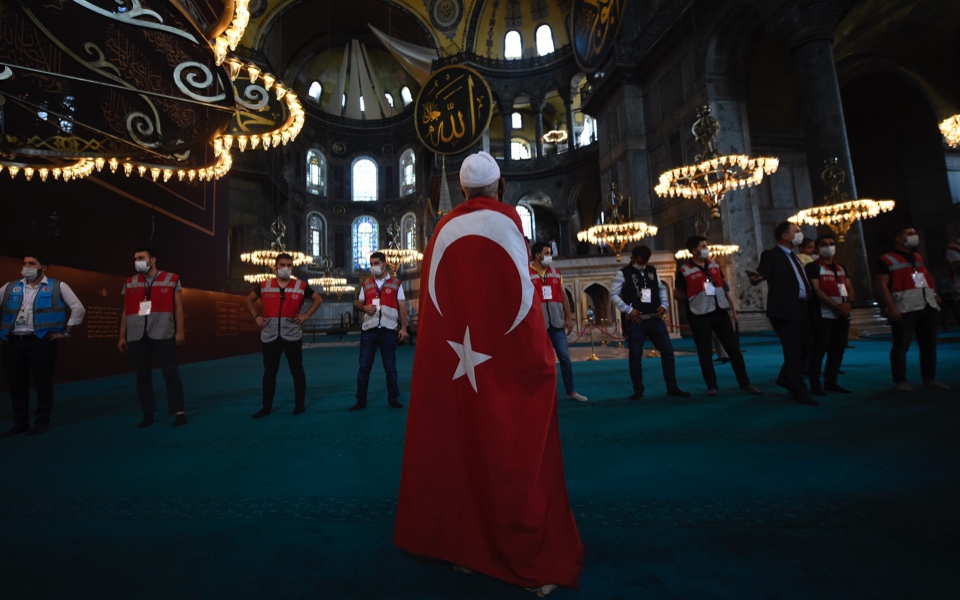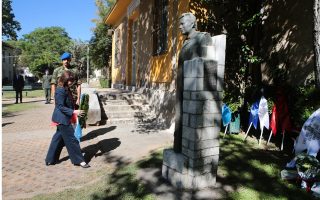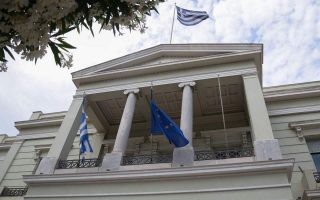Hagia Sophia prayers spark indignation

The official conversion on Friday of the historic former Greek Orthodox church of Hagia Sophia in Istanbul into a mosque was greeted with disdain and indignation by Greece’s political leadership, with Prime Minister Kyriakos Mitsotakis saying it was not a demonstration of Turkey’s power but “evidence of weakness.”
The 1,500-year-old UNESCO World Heritage monument opened to Muslim worshippers for prayers Friday for the first time in 86 years when modern Turkey’s secular founder Kemal Ataturk made it a museum. Turkish authorities decreed its conversion into a mosque earlier this month.
“Especially for us Greek Orthodox Christians, Hagia Sophia is more a part of our souls today than ever. It is where our hearts beat, turning sorrow into strength, composure and unity,” Mitostakis said.
In a statement, the Greek Foreign Ministry said the conversion cast a dark shadow over Turkey’s reputation.
The leader of main opposition SYRIZA, Alexis Tsipras said that the conversion, which also coincided with the anniversary of the the signing of the Treaty of Lausanne, “marks another step away by Turkey from the universal values that are the basis for peace and mutual respect in our region.”
“It essentially undermines interfaith dialogue… no conversion of Hagia Sophia into a mosque, however, can falsify or erase its history and its universal symbolism,” Tsipras said.
“As a Greek I feel bitter and angry,” said European Commission Vice-President Margaritis Schinas.
Church bells tolled mournfully around Greece to the sound of Byzantine hymns while at Hagia Sophia clerics sang from the Koran, with mosaics and frescoes of Jesus and Mary draped with curtains. The ceremony in Istanbul began with the recitation of verses from the Koran by Turkish President Recep Tayyip Erdogan himself.
Meanwhile on Friday, Greece’s armed forces remained in a state of increased readiness for the possibility of the departure of the Oruc Reis research vessel from Antalya in southern Turkey to the sea area of the Greek continental shelf that has been reserved in a Navtex issued by Ankara this week for seismic surveys.
Despite the general calm in the area, the Hellenic Navy’s ships have not left the positions taken in the previous days and are monitoring Turkish movements.
National Security Adviser to the Premier Alexandros Diakopoulos, however, expressed the assessment that the situation with Turkey is de-escalating. Speaking to Skai TV, Diakopoulos said that “it is not easy to bully Greece.”
“There is no evidence that the situation is going to escalate. As long as there is a fleet in the Aegean, we will be present,” he said.
Also on Friday, Ankara expressed its dismay over the statements by French President Emmanuel Macron who said, referring to Turkey, in his meeting with Cyprus President Nicos Anastasiades on Thursday, that it is not acceptable for an EU member-state’s maritime space to be violated or threatened and that those responsible must be sanctioned.
Turkey’s Foreign Ministry spokesperson Hami Aksoy said that “France should give up on delusions of grandeur and instead pursue rational policies based on common sense.”





